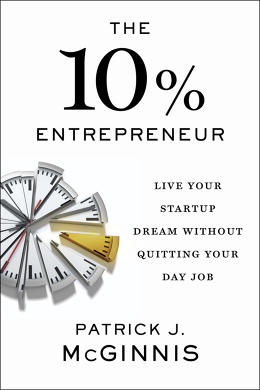My brother, Mike, is a jazz musician in New York City. Over the years, he’s invested countless hours developing his skills and reputation in the music scene. He’s lugged his saxophone all over New York and all over the world, gradually moving up in his industry and making a name for himself.
If you ask him why he chose to be a musician, his answer is simple: Music chose him. That was the only thing he ever wanted to do, and he made the sacrifices required to do it, especially in the early days when he could barely pay his bills. With success, he’s found that he can live a much better life than he might have imagined a decade ago. Perhaps he’ll even hit it big someday.
Still, if he were looking for fame and a big payday, he’d have chosen a different path. Mike once told me that he sees being an artist today as akin to being in the clergy. You do it for passion, not for money, and in that sense, you’ve already struck it rich.
It Isn’t About Getting Rich
I see entrepreneurship much the way my brother sees music. Contrary to popular perceptions, you don’t become an entrepreneur because you want to be rich or famous. You become an entrepreneur because it chooses you. That may sound overly romantic to some, but no matter when you take the plunge, you know in your gut that you just have to go for it.
Perhaps you’re the person who’s been launching businesses since you set up your first lemonade stand. Maybe you knew from the outset that you were never going to work for anyone else. Or maybe you reached that decision after years working for other people. However you got there, you had to accept first that success is terrific if it comes but that it can’t be the only thing driving your decision.
Entrepreneurship is simply too hard a road if you try heading down it for the wrong reasons, or without thinking long and hard about what lies ahead. Sometimes a great side gig should stay a side gig. If you’re considering taking that project full time and setting up shop on your own, here are two perfectly rational reasons why you might opt not to.
1. The Lifestyle Can Be Pretty Lousy
In September 2014, an entrepreneur named Ali Mese published a post on Medium titled “How quitting my corporate job for my startup dream f*cked my life up.” Mese, a former Bain & Company consultant, chronicled the unexpected personal, familial, and social stresses that resulted from his decision to leave the safe and prestigious world of management consulting to start his own company.
Having been caught off guard, Mese wanted to make sure that all the bored consultants, understimulated corporate types, and frustrated bankers who dreamed about startups from their cubicles also saw the other, darker side of the entrepreneurial allure, so he laid it bare. Clearly, the risks and trade-offs of pursuing entrepreneurship are on a lot of people’s minds; Mese’s post went viral, racking up millions of views.

The time and focus required to launch and lead a company takes a toll on you and everyone in your life. You have to rethink your financial goals, your lifestyle, and your definition of success, all while being plagued with self-doubt.
It’s generally believed that divorce rates among startup founders are the highest of any occupation, as a result of the long hours and stress. Even if your company thrives, your lifestyle may not be luxurious. If you leave your corporate law job to open a bakery and finally make a business out of your grandmother’s famous cookie recipe, you may find yourself working far more hours for a fraction of the pay. Sure, you have “freedom,” but you also have long hours, demanding clients, and the stress of making ends meet on less money, at least at the outset.
Lives, like careers, are rarely in balance, and you may find that your “dream job” has even less equilibrium than your previous job. After all the hard work and sacrifice, how terrible would it feel if you opened your bakery only to discover that you should have stayed at the law firm? It took you going all in to realize that while you enjoyed baking a few batches of cookies for your friends, you hate doing it 12 hours a day.
2. You Can Ruin Your Finances
A recent study of more than 10,000 founders revealed that 73% of respondents pay themselves less than $50,000 a year in cash compensation. Those figures are surprisingly low when you consider how much responsibility they carry on their shoulders. They recruit teams, craft and execute growth strategies, and try to raise millions of dollars of venture capital from deep-pocketed investors who expect the founders to make them richer. All those pressures and obligations for less than $50,000 a year sounds like a raw deal, right?
It may sound like a raw deal, but that is generally the deal.
Investors expect startup founders to put all their eggs in one basket and make money as the value of their shares in a company increase. Now consider that the typical venture capital–backed business takes between five and seven years to go from raising its first round of capital to producing returns for its shareholders, including the founders. Even Facebook, one of the undisputed tech heavyweights of the last decade, took more than seven years to reach its IPO. So even if your company is wildly successful, you’re going to have to wait to see the payoff.
Jonathan Olsen, an entrepreneur who’s both founded and invested in early-stage ventures, puts it best: “If you want to be an entrepreneur, you have to give up things, starting with your flat-screen TV.” And, I’d add, quite possibly much more: You may no longer be in a position to help out your parents with unexpected costs, and you won’t be writing generous checks to your alma mater.
If you’ve gotten used to being the one who takes care of those around you, having to count every penny is not an insignificant change. Everyone likes to tell stories about the founder who ran down his savings and lived off multiple credit cards before finally making it big. No one talks about the founder who couldn’t repay those bills.
This article is adapted from The 10% Entrepreneur: Live Your Startup Dream Without Quitting Your Day Job by Patrick J. McGinnis. It is reprinted with permission from Portfolio, an imprint of Penguin Publishing Group, a division of Penguin Random House LLC. Copyright (c) Patrick J. McGinnis, 2016.
